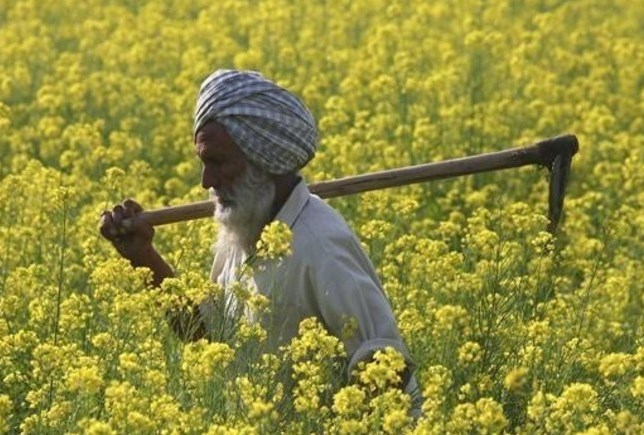
International Implications of India’s Farm Laws
This is a death warrant for small and marginalised farmers. This is aimed at destroying them by handing over agriculture and market to the big corporates. They want to snatch away our land. But we will not let them do this.
– Sukhdev Singh Kokri, a farmer
The Indian Farms Reforms of 2020 that refer to the Agricultural Bills passed September 2020 will have major long term international implications. The three new laws aim to deregulate Indian agriculture, by encouraging farmers to sell directly to companies. The current Indian Government which is keen to increase FDI (Foreign Direct Investment) is encouraging the corporate sector through these laws to enter the farming sector that will drive small farmers out of their ancestral occupation. The laws are worded in favour of big money and corporate farming. The Indian government has a slogan of ‘Make in India’.
These laws are likely to be an experiment in India and result in multinational corporations seeking similar legal frameworks and policies in other countries, pushing most small farmers out of small family holdings, which currently make 80% of farming in the world.
In the Indian farming sector, the government has long been a middleman, guaranteeing minimum prices or MSPs for some 22 main crops. The Government also provides accessible small markets called ‘mandis’. The new laws say farmers will still have price assurances, but the language is vague and open to interpretation. The farmers are nervous about losing government support. The laws favour the corporate sector, denying farmers right of access to independent courts in case of contractual disputes. The local markets are being forced out of the sector through free market forces. There was no consultation with farmers prior to them being introduced.
The reforms taken together will loosen rules around sale, pricing and storage of farm produce – rules that have protected India’s farmers from the free market for decades. They also allow private buyers to hoard essential commodities for future sales, which only government-authorised agents could do earlier; and they outline rules for contract farming, where farmers tailor their production to suit a specific buyer’s demand. The protests have been the strongest in Punjab and neighbouring Haryana state, where the mandi system is strong and the productivity is high – so only the government has been able to buy that volume of produce at a set price.
Due to the lack of global media coverage and weak response from international leaders, the Indian farmer’s protests against the new reforms are not receiving the coverage they warrant, and the rest of the world is oblivious to the wider implications these reforms carry. The impacts of the reforms stretch further than the Indian farmers, who will face mass poverty due to joblessness and not receiving the financial security the Indian government currently provides through MSP. These impacts will be felt globally, through the economic devastation it will have on millions of Indians, the irreversible environmental damage that comes with large-scale farming, and the unmatched competitions these companies in India will bring to small farmers all over the globe, inevitably putting them out of business.
ALSO READ: Are The Farm Laws Legal?
When one country’s citizens are anguishing in a pandemic of poverty, no other country should benefit from their suffering, but rather should provide financial aid to help them survive. While the Indian farmers soon to be at the mercy of the large-scale industrial farming will suffer as they will earn less or worse, nothing at all, others will also be impacted. India has the largest population of illiterate adults in the world, totalling an estimate of 287million in 2015 which unavoidably makes it harder for them to get work in other vocations. These new reforms are helping the rich get richer, while the poor get poorer, this is the point where the rest of the world must stand up and put a stop to it.
The environmental impact of large-scale farming is no new news, the devastation has been witnessed by all in the Amazon and been felt worldwide. The major difference between small farming and large-scale farming is the increase in use of pesticides, fertilizers and other toxic farm chemicals. These can poison fresh water, marine ecosystems, air and soil, remaining in the environment for generations. Many pesticides are suspected of disrupting the hormonal systems of people and wildlife, while fertilizer excess pollutes waterways and coral reefs.
The planet is already at breaking-point and as citizens of the world we need to start putting the planet before profit, hence fore, saying no to large-scale industrial farming despite the income it will bring to a government, and saying yes to supporting small farming.
Large scale industrial farming in India will create more competitions for the small farmers around the world and the big companies will be able to offer cheaper prices and lager volumes that small farms cannot compete with.
ALSO READ: When The Farmer Fights Back
Across Europe small farms are disappearing as they struggle to compete with large multinational agro-businesses. They are under pressure from land grabbing, and they face serious challenges to secure public support, as they are often considered unviable and outdated. This will only get worse when India is taken over by large-scale farming producing more food at a cheaper price. Small farms in Europe and other areas of the globe, will not be able to compete and eventually will have to sell their land to survive.
You might be asking yourself why small farming is so much better for the world, both environmentally and sociologically. While the reasons are endless, the primary five would be: it promotes communities; creates jobs; improves health of the land; improves health of the people and; provides a foundation for a more resilient food system.
The worry is that India is an experiment and that the corporate farming businesses around the world are looking at how it will play out. If the Indian government succeeds in deregulating farming in India and letting corporate sector to drive out small farmers in large numbers, other countries will follow suit. What is happening in India today, will happen around the world tomorrow. It is a threat to around half a billion small farmers globally. It will affect some of the world’s poorest people and destroy the planet. Please take action now and support petitions in support of small farmers.
Brilliant article, covering every angle. From the Government’s long term intentions to the suffering and loss these Farm Bills will bring.
It is sad to see a Government so Heartless and Stubborn, that it does not listen to the wishes of the people protesting in millions at the doorsteps of the so called largest DEMOCRATIC COUNTRY IN THE WORLD.
Just think, how does your breakfast, lunch and dinner appear at your dining table.
Support the Indian Farmers Today, so you may not have to protest tomorrow.



